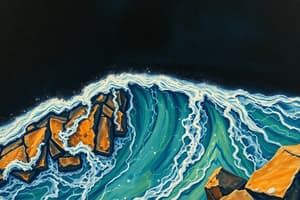Podcast
Questions and Answers
What is the main composition of the Earth's mantle?
What is the main composition of the Earth's mantle?
- Iron and nickel
- Calcium and sulfur
- Silicon, oxygen, aluminum, iron, and magnesium (correct)
- Copper and zinc
Which of the following rocks is primarily monomineralic?
Which of the following rocks is primarily monomineralic?
- Basalt
- Gneiss
- Dunite (correct)
- Granite
What is the density range of the Earth's core?
What is the density range of the Earth's core?
- 9.0 to 12 g/cm³ (correct)
- 3.0 to 4.5 g/cm³
- 1.0 to 2.0 g/cm³
- 5.5 g/cm³
Which type of rock constitutes the majority of the Earth's crust by volume?
Which type of rock constitutes the majority of the Earth's crust by volume?
Which mineral is an example of a monomineralic rock?
Which mineral is an example of a monomineralic rock?
What is the thickness of the Earth's inner core?
What is the thickness of the Earth's inner core?
Which type of scientific study focuses on the origin of rocks?
Which type of scientific study focuses on the origin of rocks?
Which type of rock is classified as igneous?
Which type of rock is classified as igneous?
What is the overall density of the Earth?
What is the overall density of the Earth?
What percentage of the Earth's crust is made up of igneous rocks?
What percentage of the Earth's crust is made up of igneous rocks?
Flashcards
Mantle Thickness
Mantle Thickness
The Earth's mantle is approximately 2,900 km thick and is made up of silicon, oxygen, aluminum, iron, and magnesium.
Core Composition
Core Composition
The Earth's core is mostly composed of iron (Fe) and nickel (Ni), and is about 3500 km thick.
Monomineralic Rock
Monomineralic Rock
A rock composed of only one mineral.
Rock Definition
Rock Definition
Signup and view all the flashcards
Mineral Definition
Mineral Definition
Signup and view all the flashcards
Igneous Rock Percentage (crust)
Igneous Rock Percentage (crust)
Signup and view all the flashcards
Sedimentary Rock Percentage (crust)
Sedimentary Rock Percentage (crust)
Signup and view all the flashcards
Granite Percentage (crust)
Granite Percentage (crust)
Signup and view all the flashcards
Shale Percentage (crust)
Shale Percentage (crust)
Signup and view all the flashcards
Outer Core composition
Outer Core composition
Signup and view all the flashcards
Study Notes
Mantle
- Thickness: 2,900 km
- Composition: silicon, oxygen, aluminium, iron, and magnesium
- Density: 3.0 to 4.5 g/cm³
Core
- Location: Inner portion of the Earth
- Thickness: 3500 km
- Composition: Metals like iron (Fe) and nickel (Ni)
- Density: 9.0 to 12 g/cm³
- Inner core: solid Fe and Ni
- Outer core: melted Fe and Ni
Density of Earth
- Overall density: 5.5 g/cm³
Rocks and Minerals
- Rock: Naturally occurring, hard mass of mineral matter formed after molten magma solidifies
- Composition: Composed of two or more rock-forming minerals (e.g., granite, basalt, gneiss)
- Monomineralic rocks: Composed of only one mineral (e.g., olivine, dunite, forsterite)
- Note: Most rocks are composed of several minerals, not a single mineral
- "Pure" monomineralic rocks rarely exist in nature
Petrology and Petrography
- Petrology: Study of rocks, including their origin
- Petrography: Description of rocks, including chemical composition and crystalline structure
Rocks in the Earth's Crust
- Up to 5 km:
- Igneous rocks: 18%
- Sedimentary rocks: 74%
- Whole Earth's Crust:
- Igneous rocks: 95%
- Examples of sedimentary rocks:
- Shales (52%)
- Sandstones (15%)
- Limestone & Dolomite (7%)
- Others (8%): conglomerate, chert
Studying That Suits You
Use AI to generate personalized quizzes and flashcards to suit your learning preferences.




